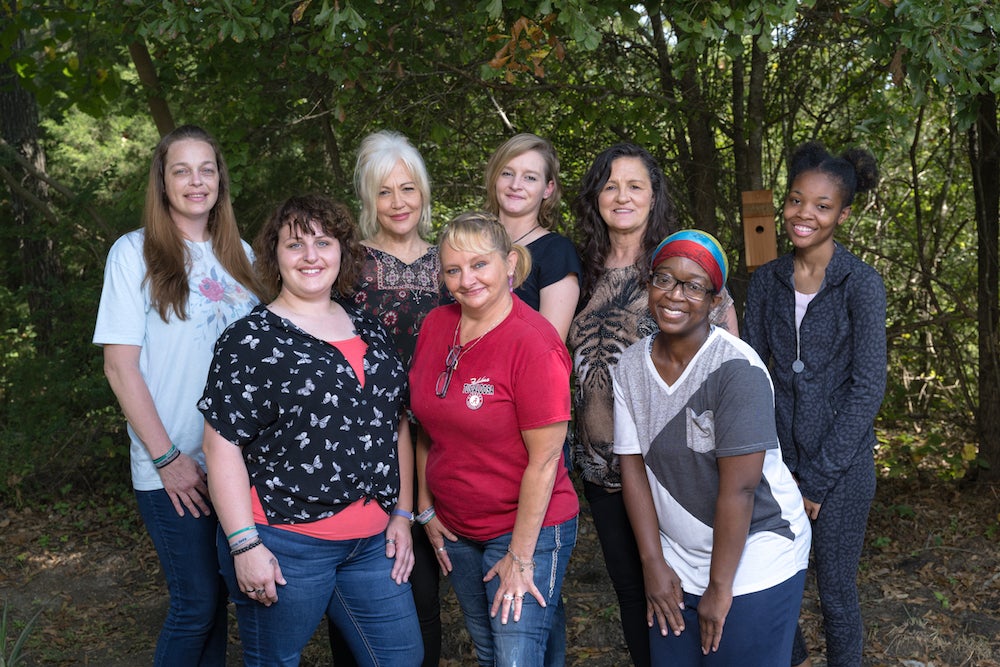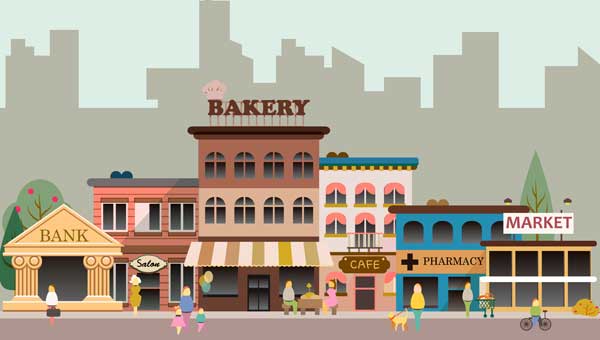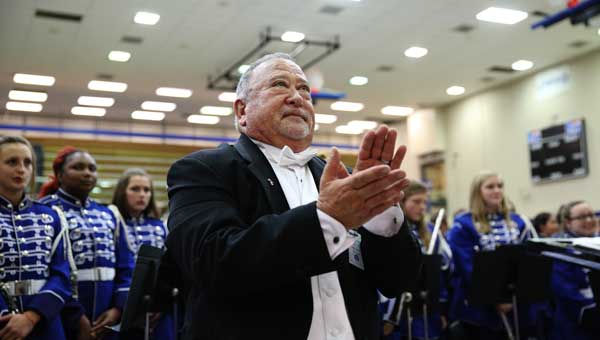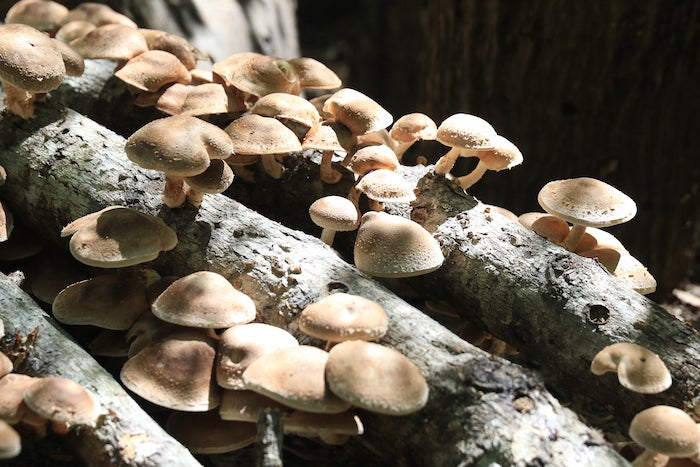By Carmen Brown
Photos by Blair Ramsey
Crissie Ashworth seemed to have the odds stacked against her from the beginning.
As she was growing up, both of her parents were heroin users and were often away from home. Her father, also an alcoholic, often traveled for work. Her mother was emotionally disconnected from Crissie and her sister. By the time Crissie was 12 years old, her mother was giving her narcotics and pain pills.
“I didn’t have a good home life or school life,” she says. “Pills made me feel good inside. I had struggled with suicidal thoughts. I took a whole bottle of aspirin once, and my mom didn’t do anything. She told me to just sweat it out.”
In 2009, when Crissie was 25, her mother was killed in a car accident. Ten months later, her father, who had been devastated and heartbroken from the loss, took his own life.
By the time she was 34, Crissie only knew a life of jail and drugs. She was about to go back to jail again because she wasn’t doing well on her probation. She knew she had to get help, or she was going to die.
“Then one day I was shooting up with a friend, who said they knew someone they had been in prison with who had gotten her life together and opened up a place to help people,” she says. “If I had not had that conversation, I wouldn’t be here today.”
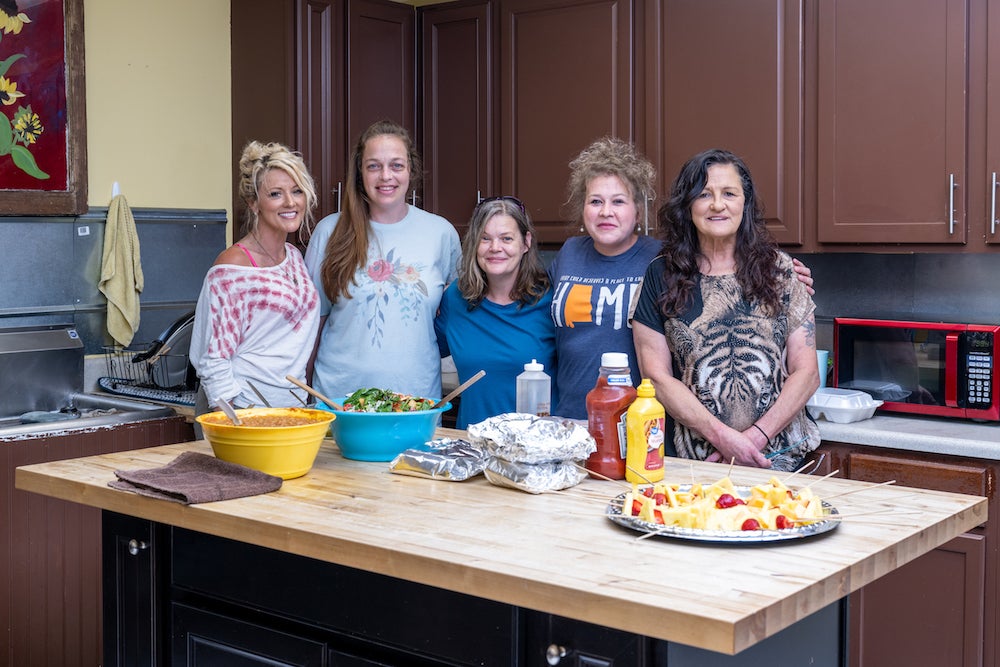
That “someone from prison” was Cindy Hildebrand, who is now the founder and director of My Sister’s Place.
Located in Montevallo, My Sister’s Place (named after an inscription on a mosaic mirror she saw while exploring a potential housing unit) is a residential, faith-based 12-step recovery program for women who come to heal from addiction, abuse and other unhealthy situations.
Cindy’s problems with drugs and alcohol began during her teenage years. From the early 1990s to the early 2000s, she had several DUIs and had been in and out of prison and drug court.
“Drug court saved my life. Long-term jail sitting changed my life,” Cindy says. “My life was falling apart, but people kept telling me things can be different.”
It was in 2004 that she decided to put her faith in Jesus Christ and began following the 12-step program at Celebrate Recovery (now called Living Recovery), at Christian Life Fellowship in Calera. She later started leading the program herself, bringing her message to local jails.
Cindy first felt the nudge to start a residential recovery program in 2008. She sent out a few letters but got no responses. Then a few years later, a conversation with a man at Celebrate Recovery led her to try again.
“I had an attorrney and a few other people, who were willing to get on board,” Cindy says. “I like to use the analogy of the old Get Smart TV show, where he keeps walking through the doors, and they just keep opening.”
The first 40 days focus on sobriety and recovery while going through the Christ-centered, 12-step program. Each woman is assigned her own sponsor, who acts as a mentor throughout the process.
Savannah Grace, development officer and program assistant (who is also Cindy’s daughter and youth pastor at Christian Life Fellowship), said the small staff of 11 make sure the women get any kind of support they need to go through the program.
“Our staff members make excellent mentors and lay-counselors because of their personal experience in the recovery process,” Savannah says. “We partner with social workers and keep them updated about the residents’ progress, and we help each resident to fulfill any necessary legal requirements or programs that they are responsible for.”
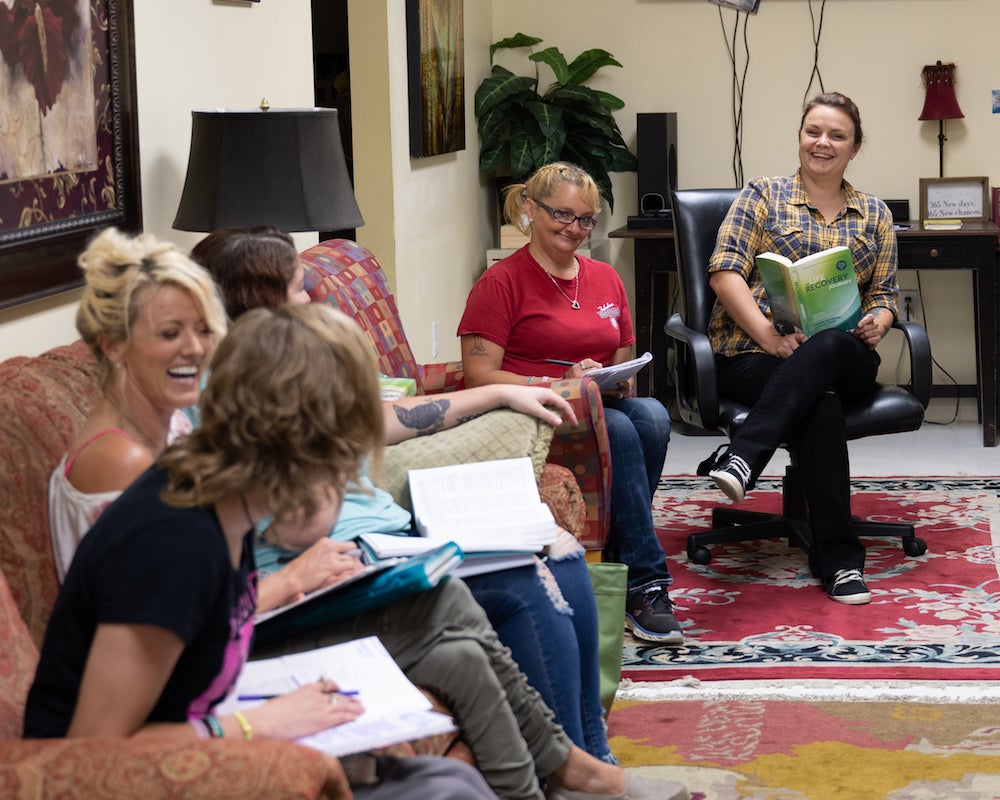
Savannah says the goal is for women to be healthier and balanced in all aspects of their lives.
“We also help women to gain financial stability and responsibility. In addition to teaching them money management, we also teach time-management, parenting and other responsibilities. Women can begin looking for a job after approximately 45 days in our program, and we help them to prepare for the application and interview process. Women do not drive while they are in our program, and we take responsibility for transporting them to recovery meetings, church, interviews, etc.”
Savannah says the program averages about 45 women, with approximately 75-80 percent of residents staying past the entry-level period. For those that complete the program, at least 70 percent continue to do well, including Crissie, who came to My Sister’s Place on June 6, 2017. She felt it was her last resort.
“The love was very unfamiliar. I didn’t know anything about Jesus. When I first heard Cindy speak, I didn’t know if I believed what she was saying, but I knew she believed what she was saying.”
My Sister’s Place operates on the belief that addiction is a “heart problem,” which can only be mended through a relationship with God.
“The problem was my mind,” Crissie says. “I had to learn to work the 12-step process. The fourth and fifth step you work through the trauma. This is where we lose a lot of people. At the end when you make amends, that’s when you see the true change.”
Residents attend church regularly at Christian Life Fellowship. Pastor Mark Davis, who also serves on the advisory board, said My Sister’s Place is one of the hidden gems in Shelby County with the positive impact it’s had on women in the community.
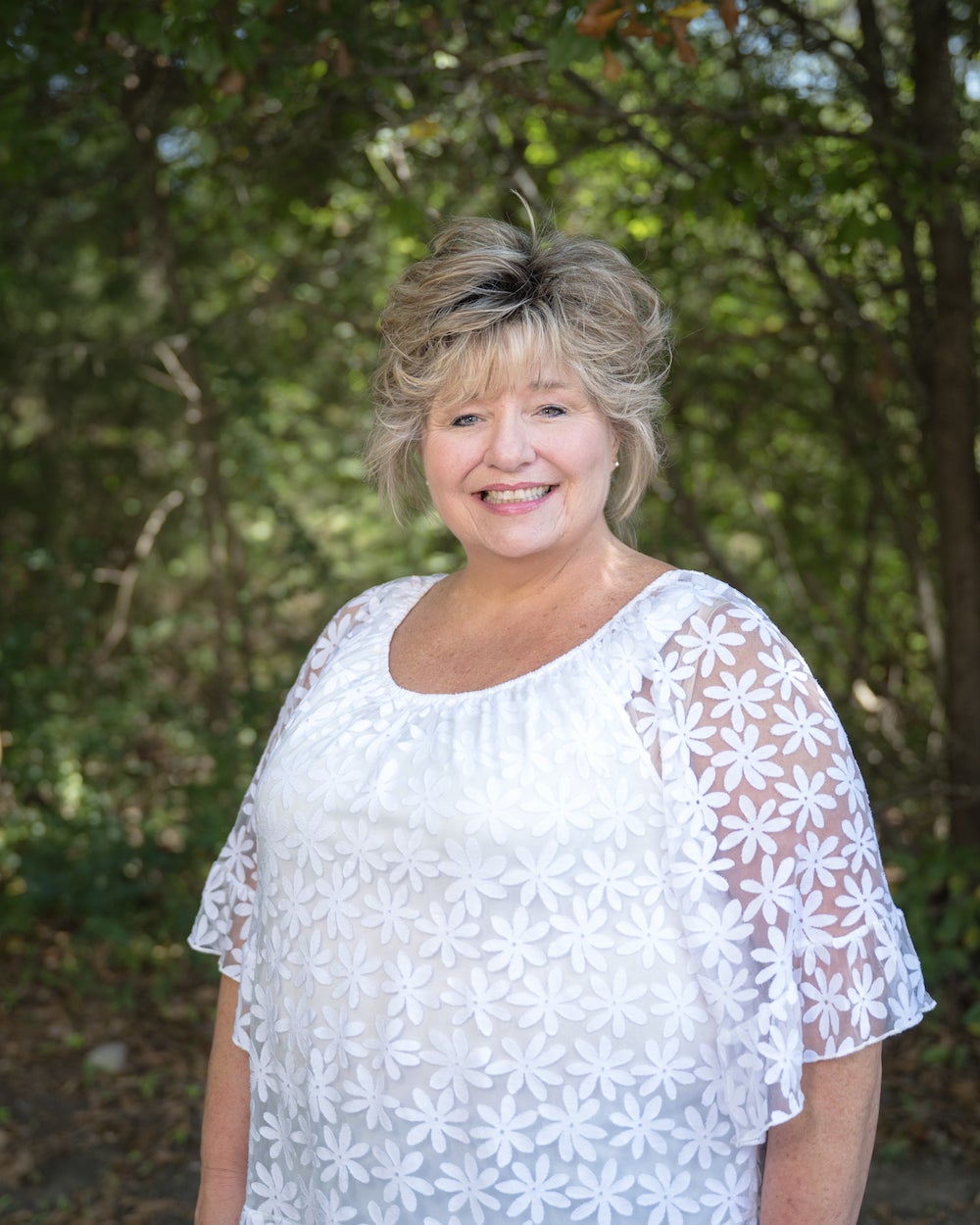
“Many of them don’t have a Bible background,” Pastor Mark says. “Some of them have a heart for God, but they’re chasing something they don’t know they’re chasing: peace, security, identity. They’re looking for someone to love them.”
Pastor Mark says the most rewarding part of the program is watching relationships between mothers and their children restored.
“Every Sunday morning, the kids will run up and hug me, and it just melts my heart,” Pastor Mark says. “To see those moms get their kids back, to see those relationships heal, that kind of reward is priceless.”
Although the program typically lasts about nine to 12 months, each woman’s situation is dealt with on an individual basis. Some women have left and returned several times before they were ready for true change.
“They go as far as they can, and then they come back because they realize they need the accountability,” Pastor Mark says. “There’s no ‘I told you so’ here. We just give them a hug and love them.”
Tiffany Andrews came to My Sister’s Place the first time in 2017. She had started using drugs at 17 and her father, an alcoholic, had passed away. She left the program after four days. Two years later, she was in a car accident. Tiffany’s feet were severely crushed. She had to be airlifted to UAB. Her husband of five years, Christopher, was killed instantly.
“I was completely lost and shattered,” she says. “He was my best friend.”
Tiffany started drinking and taking painkillers. She reached out to Crissie and asked for a Bible because she didn’t have one.
“She told me, ‘don’t let his death be in vain,’” Tiffany says.
Tiffany called Cindy about returning to My Sister’s Place, telling her about the accident and how she couldn’t work because she could not walk.
“A few minutes after I talked to her, she said someone came in and asked her if anyone needed help with an entry fee. That was God,” she says.
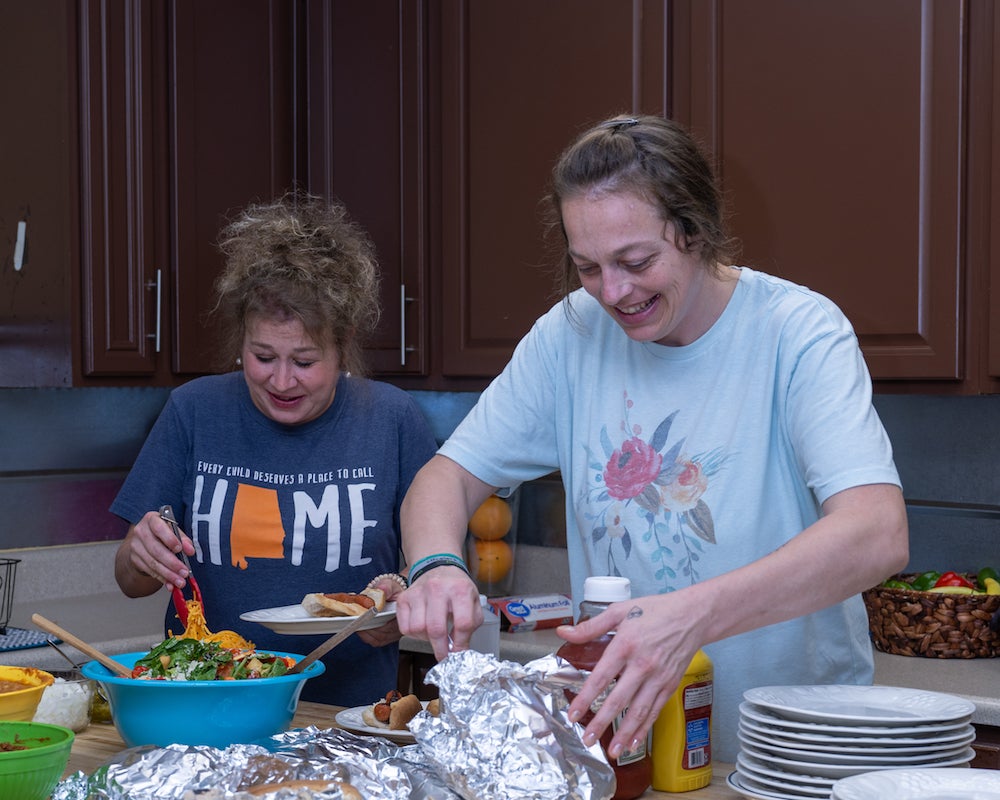
Cindy and Savannah both emphasized that My Sister’s Place is not strictly for recovering alcoholics or drug users.
“It is a life recovery program that is open to anyone struggling with any kind of issue as long as that person is willing to work the program,” Cindy says. “It’s for broken people who need time to heal.”
“We get people from all kinds of backgrounds,” Savannah says. “People struggling with mental health issues, domestic violence, homelessness or unhealthy dependent living situations.”
My Sister’s Place recently celebrated its 11th anniversary in October and continues to grow. My Sister’s Place is currently looking for more after-care housing for women like Crissie and Tiffany, who have come through the program with their lives forever changed.
Tiffany was able to get grief counseling through the church, and she went through physical therapy so she could walk again. She now works a full-time job.
“I was in the deepest, darkest place,” she says. “The only way out I knew was death. God opened the door and made a way.”
Now the assistant ministry leader at My Sister’s Place, Crissie feels it is her mission to rescue other women who have lost hope.
“I believe if you’ve been in a dark pit, go find somebody else who’s in that pit and get them out,” she says.
Crissie now has restored relationships with her two daughters, ages 20 and 16, and her 8-year-old son.
“The Lord really had to come in and work,” she says. “I want to tell people you can live another way. Look at my life now. You can have this, too.”
For more information on the program or to volunteer or donate, call 205-434-0701 or go to mspalabama.com. My Sister’s Place, a 501 C-3 nonprofit, also runs a thrift store, Restore54, located on Highway 31 in Downtown Calera.

